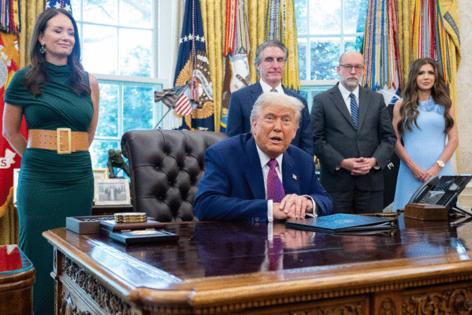Trump says Chinese students can stay at US universities, but uncertainty remains
Published in News & Features
President Trump said Wednesday that Chinese college students, who two weeks ago were threatened with losing their visas to study in the U.S., can stay here as part of a trade deal negotiated with China.
The announcement, though, did little to quell the anxiety and uncertainty brought on by months of the administration targeting international students at the nation’s university campuses.
“We’ll believe it when we see it,” said Rachel Banks, senior director for public policy and legislative strategy at NAFSA: Association of International Educators, an 11,000-member group that advocates for global education.
For now, she said, the situation remains fluid after a series of “ping-ponging” directives from the White House. It remains unclear how Trump’s statement, made in a social media post, would translate to the process of applying for or renewing student visas.
During recent months, international students have had their visas revoked, although in some cases they’ve been restored, and the U.S. has suspended the interviews necessary to apply or renew them. Some have had difficulty re-entering the U.S. after trips abroad, leading some universities to advise students not to travel.
Trump said in a post on his Truth Social account that the trade and tariff deal would allow the U.S. to obtain magnets and rare earth materials from China, and in exchange, “we will provide to China what was agreed to, including Chinese students using our colleges and universities (which has always been good with me!).
Students and their college programs have been struggling with how to address the ever-fluctuating directives.
“People who are on student visas, there’s a real climate of uncertainty,” said Margaret Pearson, a government and politics professor at the University of Maryland, College Park, who works in the field of Chinese policy. “It’s very confusing in general. There are so many moving parts. It’s all so not transparent and constantly changing.”
The Chinese students in her PhD program are “very nervous,” and several declined a request forwarded to them to speak to The Baltimore Sun, she said. One recently admitted student for the coming academic year, who is from Shanghai, will need to get a visa. But Pearson said she does not know if he had been able to schedule the necessary interview at the consulate office there.
Last month, the Trump administration stopped scheduling student interviews at U.S. embassies and consular sections abroad. According to news reports, the administration ordered the pause as it considered expanding the vetting of applicants’ social media activity.
The Chinese students in her program generally return home every three or four years because the expense prevents more frequent visits, Pearson said. Now, they’re afraid to travel at all for fear of being questioned or denied entry upon their return, she said.
“‘Do I go home and renew my visa?'” she said her students have been thinking. “‘Do I dare to leave the country?’ There’s no reliable guidance I can give.”
The uncertainty over Chinese students comes after months of the Trump administration targeting different groups of visa holders.
In April, an estimated 1,500 student visas were revoked nationwide, including at Johns Hopkins University and the University of Maryland campuses. Later in the month, however, some were restored after a court order led to a reversal of the termination.
The focus then turned to Chinese students specifically, with Secretary of State Marco Rubio saying on March 28 that his department would “aggressively revoke visas for Chinese students.”
And then earlier this month, the Trump administration issued a travel ban against citizens of 12 countries and partial limits against seven other countries. Saying the move “may add further stress to our international community,” UMCP officials offered services and counseling to students and staff who might be affected.
According to NAFSA, students from abroad are about 6% of the U.S. higher education population, although schools like Johns Hopkins University, have a much higher proportion. A recent article in The New York Times found Hopkins had the seventh highest percentage, 39%, of international students among selective four-year schools with at least 1,000 students.
Banks of NAFSA said beyond the immense academic and cultural contributions international students and scholars bring to the U.S., they also add an estimated $43.8 billion to the economy.
“It remains to be seen” how chilling an effect the Trump administration’s actions on student visas will have on that, she said. “It certainly is a disconcerting time to be in this moment now.”
_____
©2025 Baltimore Sun. Visit baltimoresun.com. Distributed by Tribune Content Agency, LLC.







Comments